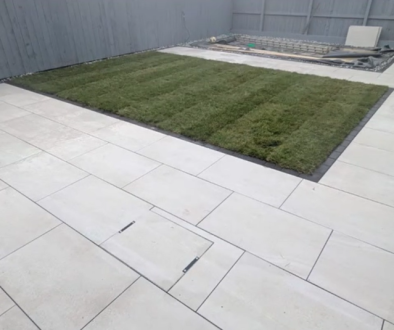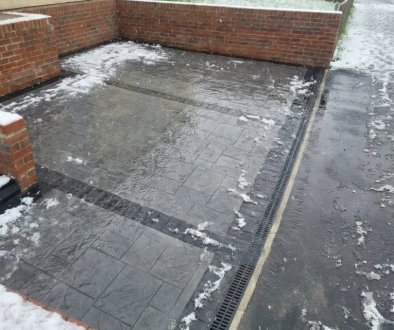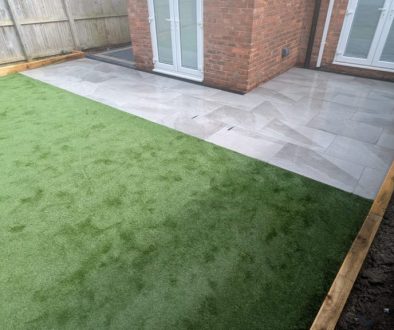Resin vs Block Paving: Which Handles UK Winters Better?
When winter arrives in the UK, driveways face months of cold mornings, constant dampness, and repeated freeze–thaw cycles that quietly test the strength of every surface. Homeowners often assume a driveway performs the same way all year round, but winter reveals weaknesses that go unnoticed in warmer months. Cracks widen, blocks shift, puddles appear, and surfaces that looked perfectly fine in September can show visible wear by February.
This is why many homeowners reconsider their driveway material before the cold season begins. Resin and block paving are two of the most popular choices in the North East, but they behave very differently in winter. Understanding how each one handles frost, moisture, and temperature changes can help you make a confident long-term decision.
How UK Winters Impact Driveway Surfaces
Before comparing the two materials, it helps to understand what winter actually does to a driveway. Temperature fluctuations cause the underlying ground to expand and contract, and water plays a major role in this movement.
When water penetrates the surface and freezes, it expands — forcing apart joints and creating pressure beneath the driveway. Over time, this leads to sinking, lifting, cracks, and surface wear. Heavy rain can also overwhelm poor drainage systems, leaving standing water that accelerates deterioration.
Some materials cope well with this natural movement; others need more maintenance or careful installation to stay stable.
Resin Driveways in Winter
Resin-bound systems have become a popular choice for homeowners wanting a low-maintenance, modern surface. Winter performance is one of the main reasons behind their growing popularity.
Resin is naturally flexible, which makes it more forgiving during cold weather. When the ground moves slightly — as it often does during freeze–thaw cycles — the resin surface can accommodate minor shifts without cracking. This flexibility is a major advantage compared with more rigid materials.
Resin is also permeable, meaning water drains through the tiny gaps between stones rather than sitting on the surface. By reducing standing water, resin prevents the frost damage commonly caused by water freezing and expanding on top of the driveway. This permeability also reduces the risk of slipping during icy weather.
However, resin is not completely maintenance-free. In winter, moss and algae can develop quicker due to low sunlight and frequent dampness. Regular cleaning helps preserve traction and appearance. Resin is also sensitive to surface contaminants, so winter debris such as leaves should be cleared promptly to avoid staining.
Block Paving in Winter
Block paving has long been a favourite for its aesthetic versatility and ability to complement both traditional and modern homes. But winter can affect it in ways resin doesn’t.
Block paving performs well in winter — if the sub-base is strong and the drainage is well-designed. Because the surface is made up of individual blocks, water can drain between the joints, reducing the chance of frost damage. However, these joints also make block paving more vulnerable if sand levels drop or weeds push through.
The biggest winter issue for block paving is movement. If the foundation wasn’t compacted correctly or if the driveway sits on clay soil that swells in winter, blocks can lift or sink. Freeze–thaw cycles exaggerate these movements, causing rocking blocks or uneven patches that become more noticeable as winter progresses.
Block paving is also more prone to moss growth during damp, cold weather, especially in shaded areas.
Despite this, block paving remains very durable when maintained properly. Re-sanding joints in autumn, checking drainage routes, and replacing any loose blocks before winter all help extend its lifespan and improve performance in cold weather.
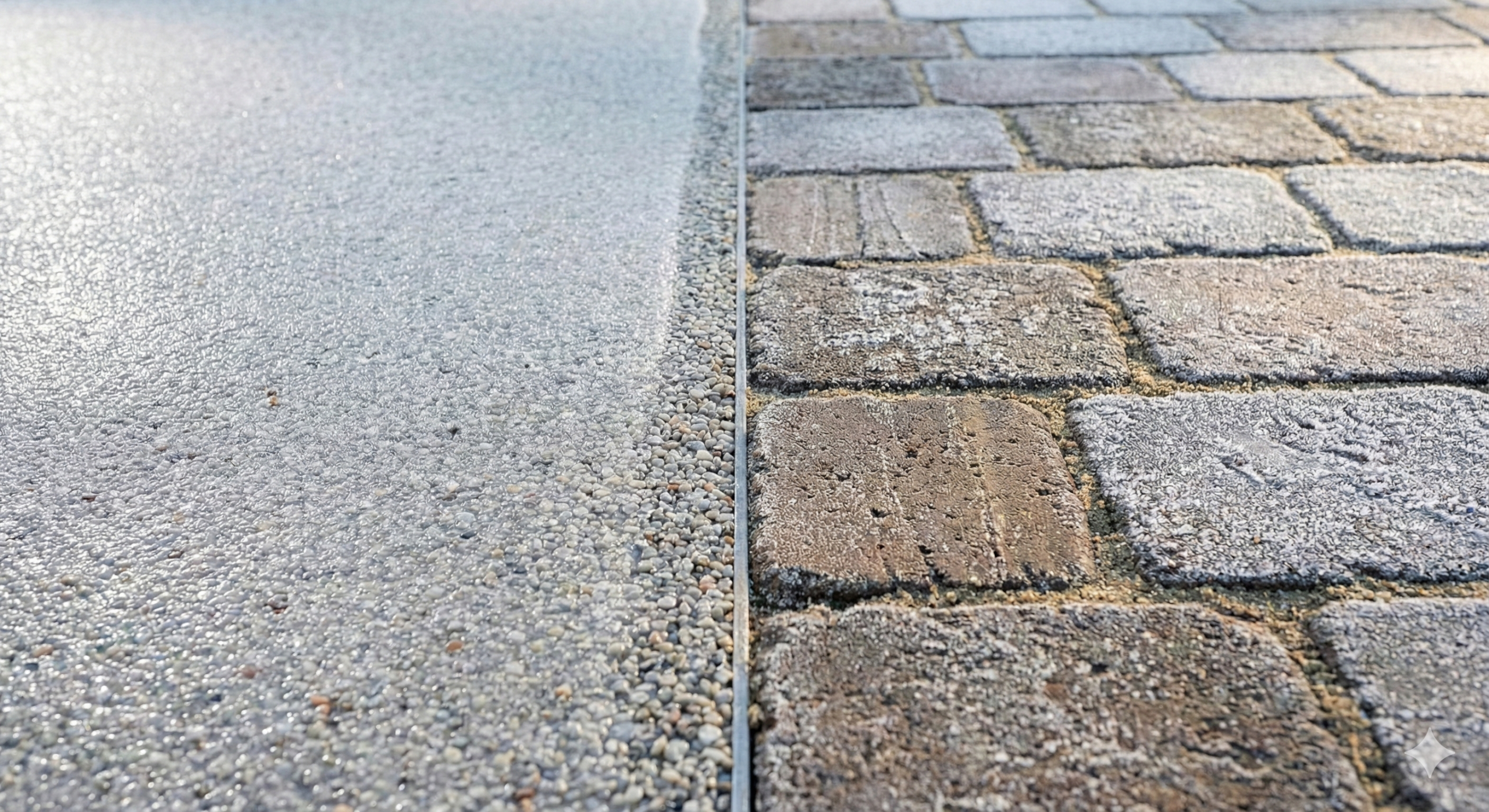
Weaknesses of Each Material During Cold Seasons
Although both materials can perform well in winter, neither is perfect. Understanding their weaknesses helps homeowners prepare for seasonal care.
Resin driveways, while flexible, may become slippery if algae forms on the surface. Homes surrounded by trees may see quicker organic build-up in winter. Resin can also struggle if the sub-base is weak or if the installation wasn’t carried out to a high standard.
Block paving, on the other hand, is more vulnerable to movement. If the bedding layer erodes or sand washes out, individual blocks can lift, tilt, or wobble. Areas with high water saturation or shaded garden positions are particularly vulnerable to frost heave.
Both materials rely heavily on proper installation. A strong sub-base and good drainage design are what make either material survive UK winters.
Lifespan and Maintenance in Winter
Maintenance plays a key role in how well resin and block paving hold up during the colder months. Resin requires minimal upkeep — sweeping away debris and occasional washing helps keep the surface clear. Because resin is permeable, maintaining its drainage ability is essential.
Block paving requires more attention. Re-sanding joints in early autumn helps lock blocks into place and reduces water penetration. Regular sweeping removes moss spores and prevents algae growth. If any blocks become loose before winter, re-setting them prevents ongoing movement.
With proper maintenance, both materials can last many years. Resin often lasts 15–20 years, whilst block paving typically lasts 20–25 years, provided the sub-base remains stable.
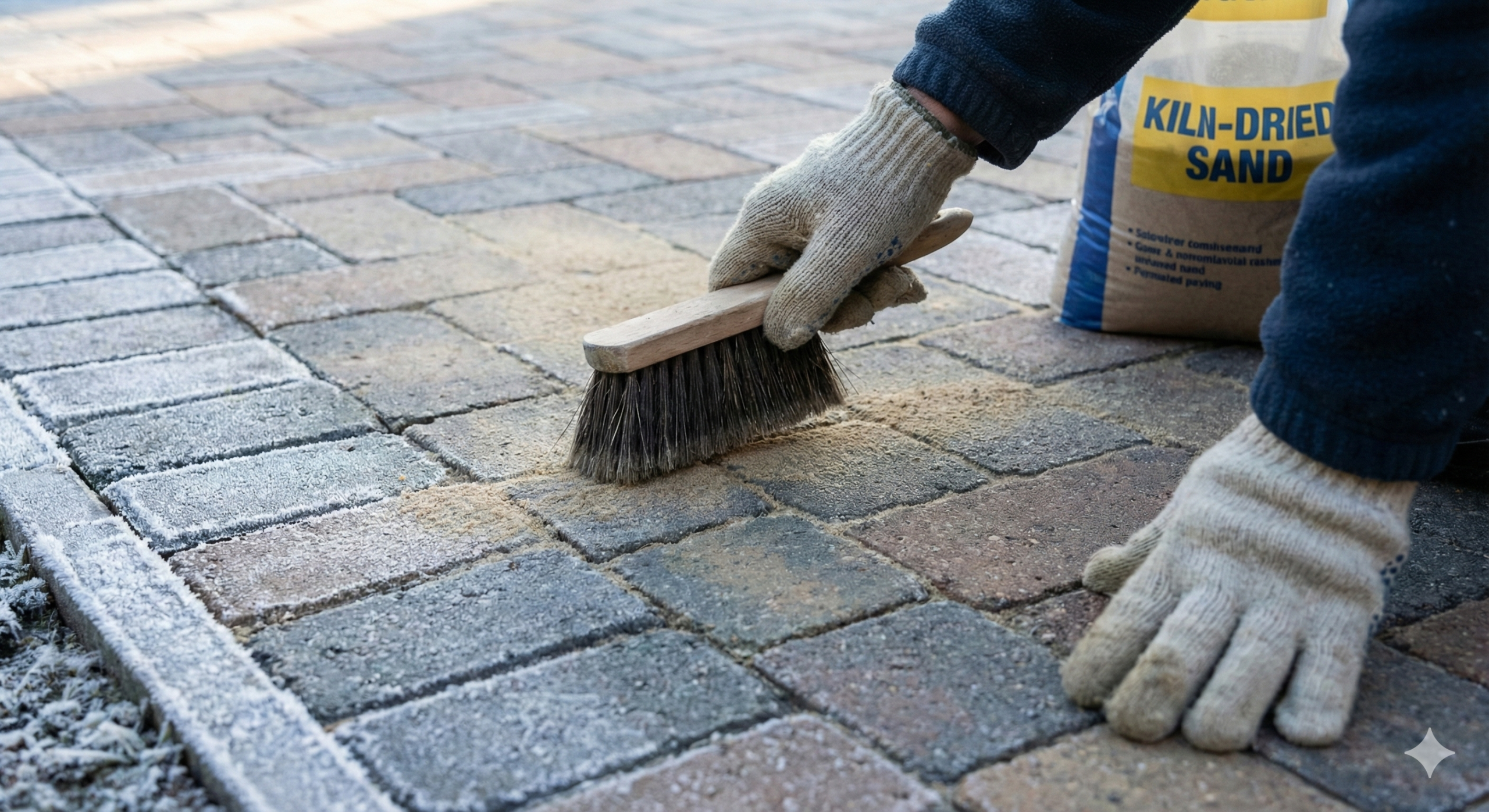
Comparing Performance in UK Winters
Here is a clear comparison to help homeowners choose the right material:
Resin Driveways
- Excellent flexibility during freeze–thaw cycles
- Highly permeable, reducing frost-related damage
- Minimal maintenance required
- Can become slippery if algae build-up is left unmanaged
Block Paving
- Durable with a strong, stable sub-base
- Individual blocks can be replaced easily
- Vulnerable to movement if sand levels drop
- More maintenance-intensive in winter
Neither is universally better — the right choice depends on the property, the soil conditions, and how much upkeep homeowners are willing to commit to.
Choosing the Right Surface for Your Property
Resin is ideal for homeowners who want a modern, low-maintenance surface that performs reliably in winter. Its permeability and flexibility make it highly resistant to frost damage.
Block paving is a strong option for those who prefer traditional aesthetics and want the freedom to replace individual blocks if issues arise. With good care and a solid base, block paving handles winter extremely well.
When selecting a driveway material, consider the garden’s exposure, drainage conditions, soil type, and how much time you want to spend on upkeep.
Winter-Ready Surfaces Installed Professionally
A driveway is exposed to more stress in winter than at any other time of year. Choosing the right surface can prevent cracking, movement, and water damage as temperatures change. Whether you prefer the modern reliability of resin or the traditional strength of block paving, proper installation is the deciding factor in long-term winter performance.
For advice on winter-ready driveway installations, contact M&C Paving Northeast for expert guidance and professional workmanship.


